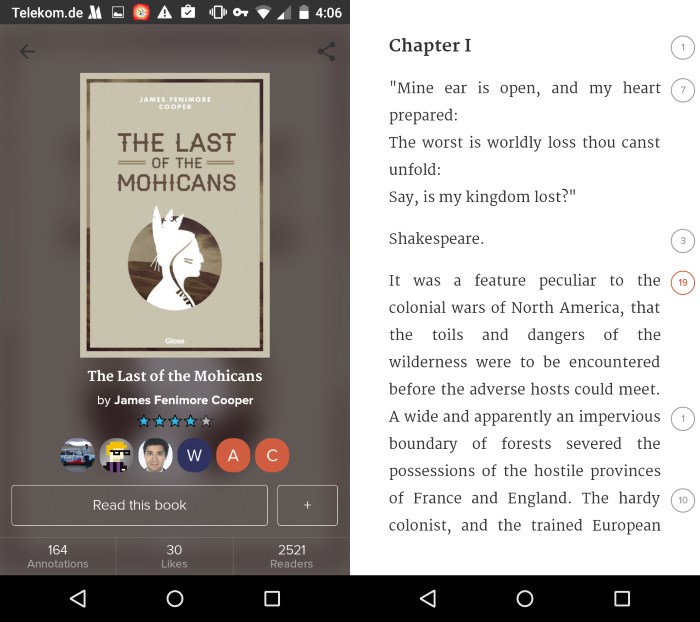Glose’s social ebook reader released for Android
When I compare how I read non-fictional books to fictional ones, I come to the conclusion that I read them in a different way.
I like to read fictional books from start to finish without distractions or spoilers, and avoid this as good as possible until I finish reading the book or series.
For non-fictional books, I find myself using the Internet quite often to look up additional information. If it is a programming book for instance, I might browse errata on the publisher website, search for answers online for instructions or information that are not clear, or simply look up other code examples or methods to improve my understanding.
Glose, a social ebook reader and shop, tries to bring the best of two worlds together by adding social annotations to ebooks.
When you first join Glose you are asked to pick books and areas of interest. You do get 10 free ebooks then added to your account, and may add other free or paid books as well. The books that are added to your account seem to be classics mostly that you get for free in other places as well.
I got The Last of the Mohicans by James Fenimore Cooper, The Metamorphosis by Franz Kafka, and other classics added to my account.

The feature that sets Glose apart is that it supports annotations. Since you may not always want annotations, for instance if you are like me and prefer reading books without distractions, then you can easily switch them to "me" or "friends" which limits them to your own annotations or those by close friends.
Annotations are displayed as bubbles next to the text you are reading. You may tap on them any time to read them. Doing so opens them on a new page which breaks the reading flow as you will find yourself switching between the actual book and the annotations frequently if you make use of the feature.
The usefulness of the feature depends a lot on the quality of annotations, and it is mixed as you can imagine especially when you are reading free books. The experience can be totally different however when you are reading non-fictional books that are not free as the quality of annotations goes up as the overall number of annotations goes down.
Still, unless friends, co-workers or other people you trust join and read the same books you do, you may end up blocking annotations more often than not as you cannot control the quality and don't get a preview either. One thing that would be quite useful but is not available is a block or blacklist feature as you may want to exclude annotations from some users who you don't agree with or who don't add anything of substance.
Verdict
The idea to add social to books is certainly an interesting one. Especially the annotation feature needs to be mentioned here and while it requires improvement, some may find it useful.
I can see it work well for classes or project teams, but the global approach is not working for me for a couple of reasons. First, while some annotations may be useful, you always have to flip to the annotations page to read them which breaks the reading flow. Then, annotations may be anything from book quotes to unrelated comments. Last but not least, you don't know anything about the users who leave the annotations.
A rating system of sorts for annotations could improve this so that you could set a threshold for annotations to filter out users who post lowly rated ones more often than not.
This article was first seen on ComTek's "TekBits" Technology News

- Log in to post comments